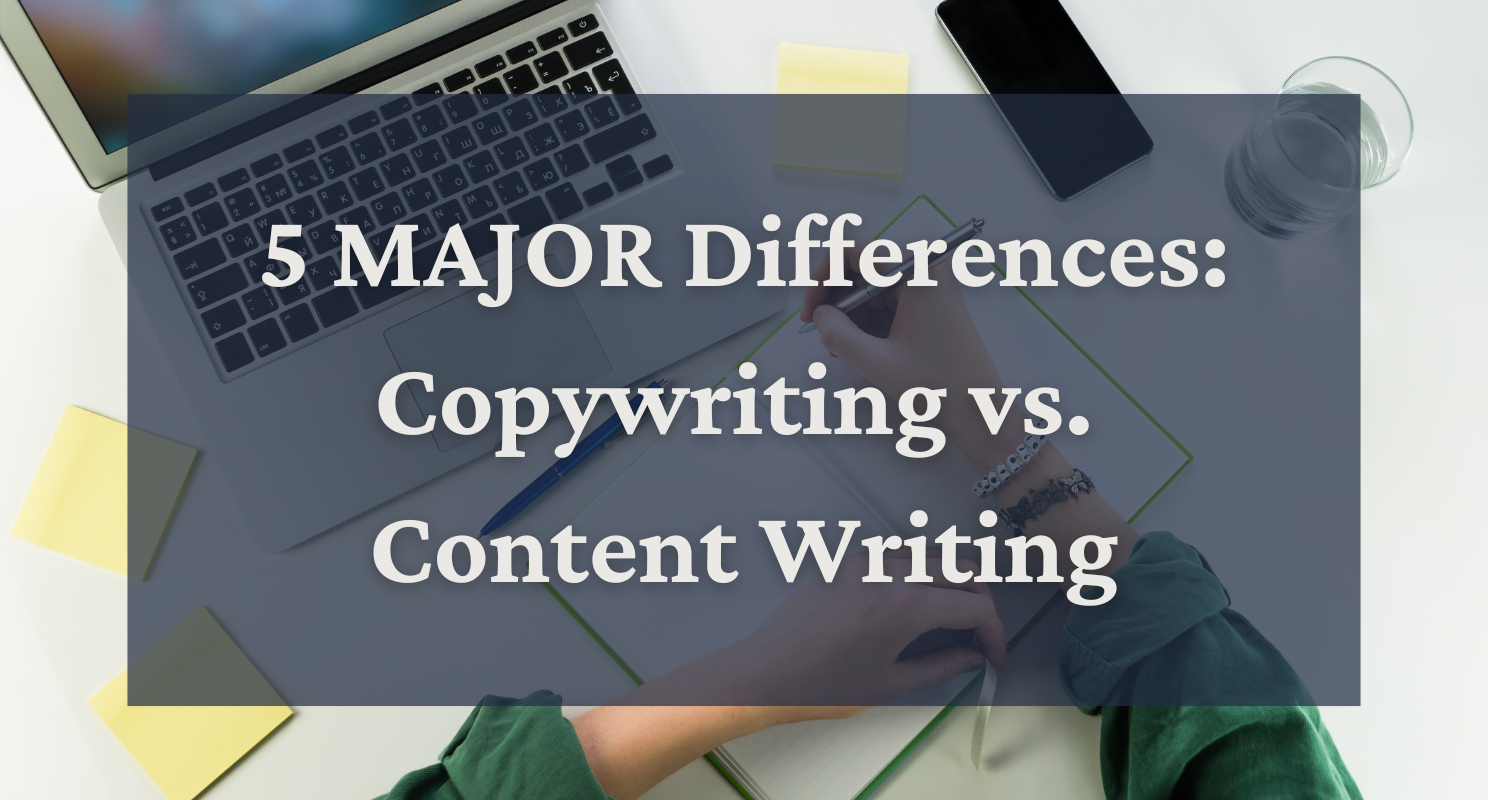- Home
- Blog
- Business Category
- Copywriting Vs. Content Writing
5 MAJOR Differences: Copywriting Vs. Content Writing

So, you’d like to be a writer. Or,
at the very least, you’d like to handle the writing for your business. That’s
great! As a freelance writer myself, I can say you’re in good company.
The first thing you should know is
there are many kinds
of writing. Today, we’re focusing on two of the biggest: copywriting and
content writing. Pretty much every single business on the planet can benefit
from these two specific services!
But there are some major
differences between copywriting vs. content writing. And you need to know them
before you can decide which one you want to pursue. You can even learn how to
do both, just like me!
And be sure to stick around until
the end, because I’ve got a bonus tip to help you figure out which path is
going to be best for you.
What is Copywriting?
Copywriting has nothing to do with
copyrights. While these words sound the same, they’re about completely
different things.
So, what is copywriting? Copywriting
means writing the text, also called the copy, used in marketing and
advertisement materials.
Google ads… Facebook ads… Mailers
from companies… Even requests for donations from charity… the text you see in
ads and marketing is called copy.
Someone has to come up with the
ideas and the words you see on these promotional materials. That person is a copywriter.
Or a business owner who also writes their own copy, which is also very
common.
What is Content Writing?
Content
writing refers to the words used in pretty much anything that isn’t an ad.
Blogs… website pages… newsletters… even video scripts… all fall into this
category.
Basically, content is anything
people read or watch for educational or entertainment purposes. TikTok videos
are content. The video you’re watching right now…. Is content!
Just like with ads, somebody has
to think of all the words that go into every single article, video, podcast,
etc. That person is a content writer. Or a business owner who also
writes their own content, which is super common.
Now that you understand the basics of
copywriting vs. content writing, let’s dig into the major differences between
them.

Major Difference #1 – The Purpose
The first major difference between
copywriting vs. content writing is the overall purpose. The purpose of
copywriting is getting the audience to buy something. But the purpose of
content writing is to inform the audience about a specific question or topic.
You’ve almost definitely seen some
form of advertising
today. Ads play before videos, they appear at the top of Google searches, and
we even see them in our social media feed.
And all of them are trying to get
you to buy something, whether it’s sour candy or a digital course or cat toys. While
ads are sometimes informative, they mostly convince you to purchase—usually
with a limited-time offer, a glowing review, or a bonus freebie.
As for content, what you’re
reading right now is content! And I’m not here to sell you anything. My sole
purpose is to shed some light on this question that I hear multiple times per
day, every single day.
The simplest way that I like to
think of copywriting vs. content writing in terms of purpose is: the purpose of
copywriting is to sell, and the purpose of content writing is to inform.
Major Difference #2 – The Timeline
The second major difference
between copywriting vs content writing is the timeline of the sale. I mentioned
a bit ago that most brands use both copywriting and content writing, right?
Here’s what that might look like
in practice:
You want to choose a new,
healthier brand of wet food for your cat.
In order to make that decision,
you need to be informed on ingredients and whatnot, right? So you do a Google
search on “what ingredients to avoid in wet cat food” because this will make it
easier for you to narrow down potential choices.
And you find this article by RAWZ
Natural Pet Food with lots of great info about what to avoid and how to be
on the lookout. Now, RAWZ sells wet cat food, but this article isn’t an ad.
It’s a super-informative piece of content. It’s not really trying to sell you
anything.
Sure, the article mentions finding
a pet store near you at the very end, but even this isn’t really pushing you to
buy.
Instead, the article lays the
groundwork for you to potentially buy in the future.
Okay, so you keep researching, and
you narrow it down to a few brands. You’re scrolling through Facebook, and you
see this
ad from RAWZ. See how it says
“Available on Amazon!” and “Shop now”?
This language is designed to
encourage you to act right now. It literally says “now” right on the ad,
right?
That’s what I mean when I say the
timeline is different. The timeline for copywriting is getting the reader to
act now, while the timeline for content writing is getting the reader to act
sometime in the future.

Major Difference #3 – The Technical Details
Both copywriting and content writing
depend on technical details. Don’t get me wrong; both allow for loads of
creativity and new ideas. But there are still certain aspects that are
universal.
With copywriting, the technique is
in leveraging emotions. Ultimately, people buy things for emotional reasons,
not rational ones. Then, we like to know logical facts that support the
emotions guiding that choice.
For example, in a car commercial, do they
open with facts about the vehicle’s safety awards or gas mileage? No! Every ad
I’ve seen starts with driving through a city at night, or windy mountain
roads—an image that elicits an emotional reaction like, “Wow! Imagine how great
it would feel to have a nice SUV that I could drive up to the mountains on the
weekends.”
Then, they hit you with the facts
and figures to convince you the decision is a smart one. This is a basic
example, but at the end of the day, copywriting comes down to human emotions
and a bit of psychology.
Now content writing, on the other
hand, requires attention to detail in terms of grammar, sentence structure, sources,
and data. No matter what language you write content in, it has to sound natural
and correct when someone reads or watches it.
Plus, every brand has their own
guidelines on what sort of grammar and tone they use in their content. You have
to be a chameleon in some ways—able to make your writing blend seamlessly with
the content that brand has already created.
Content writing often requires a
bit more research than copywriting, too. For a short ad, you typically don’t
need to research facts and figures. But with content writing, you’re educating
somebody. That means making sure everything you say is accurate, and adding
statistics to strengthen your points.
For example, I'm working on a post about
10 little-known copywriting niches no one talks about. While writing that, I
had to look into every single niche I mentioned to pull the appropriate data.
And the content is stronger for it! If I just listed these 10 niches without
telling you why I picked them, how believable would that information sound. Not
very!
Whereas if I was selling you a
course on how to find your niche as a copywriter, I wouldn’t need to mention
all of that in the ad for the course. Instead, I’d talk about my expertise, what
you’ll get out of the course, and the positive reviews.
See the difference there?
Copywriting involves techniques related to emotions and persuasion, while
content writing requires excellent grammar and research skills.
Major Difference #4 – The Length
The fourth major difference
between copywriting vs content writing is the typical length of each piece. Copy
tends to be short, snappy, and to the point.
I’ll say immediately that this
isn’t always the case, of course—some sales pages are thousands of words long.
And many of us remember the long
infomercials of days gone by.
But generally, in the world of
ads, we’re talking a few sentences or a couple paragraphs at most.
Now content, on the other hand, is
usually much longer. Blogs can be anywhere from 500 to several thousand words
long. YouTube videos that are more than a few minutes long require a fairly
long script to cover all the topics. Even BuzzFeed articles typically take a
few minutes to read.
And you might find one to be
easier than the other.
For me, writing copy is definitely more challenging than
writing content. As you can tell from this post, I’m an explainer! I love
details, facts, and educating someone as effectively as possible.
So when I have to write an ad
that’s just a sentence or two long, it can take me a while to whittle down
everything I want to say into just the most important details.
But I know people who find content
writing to be a little trickier. Sometimes they feel like they don’t have
anything to say, or don’t know where to start. Depending on your personality,
it’s totally normal to find one a bit more natural than the other.
The good news is, you can always
learn how to do whichever isn’t the more natural fit.

Major Difference #5 – The Skillset
Okay, so all of these things we’ve
covered lead to the final major difference between copywriting vs. content
writing: the skillset!
Now I want to say again, I truly
believe anybody can learn either or both of these skills. Sure, natural “talent”
might help someone get a slightly quicker start. But ultimately, that person
would need to learn the same techniques and skills as someone with no
inclination or past writing experience.
With copywriting, the cornerstone
of your skillset is communicating in a persuasive, convincing, and natural way.
When I say “natural,” I just mean your copy needs to sound the way someone
would naturally speak. You don’t need to be a native speaker to hone this
skill.
You also need to be able to
communicate points effectively and clearly. When it comes to copy, less is
often more—meaning the less words you need to get the sale, the more effective
the copy will be.
As a content writer, however, you
need to focus on being authentic while educating your audience. This means you
have to present details and important points in a way that makes sense to your
reader or viewer. Your content can’t be boring, uninformative, or seem like it
was put together in a rush.
This post is meant to hit on all
of those points. While I’m diving into the details of these major differences,
this guide (hopefully!) isn’t like sitting in a boring lecture with an
instructor who’s just counting the days to retirement.
You need to be able to talk about
the topic of your content in a way that’s engaging and interesting for your
audience and ensure you choose topics that truly matter to them. You’re not
trying to persuade them to do anything—you’re just sharing helpful information.
Okay, to summarize that,
copywriting requires a strong skillset in persuasion, sounding natural instead
of sales-y, and making your point with just a few words. Content writing requires
a strong skillset in being engaging and authentic, plus explaining information in
clear detail.
BONUS – How to Pick Where You’ll Start!
Now that you understand these 5
major differences between copywriting vs. content writing, you may feel more
naturally interested in one over the other. If this is true for you, I highly
recommend you lean into that preference.
If you’re still unsure, the
biggest thing to remember is that you aren’t making a permanent choice here.
You can change your mind anytime, or even decide to learn both—which is very
common!
With that in mind, think about
your current hobbies, past job roles, and favorite school subjects when you
were younger.
Do you enjoy persuading people?
Maybe you were in the debate club, or you’ve enjoyed sales in a past job role? If
this sounds like you, copywriting would be a great place for you to
start. It’s all about the art of persuasion and crafting effective sales
strategies.
On the other hand, do you enjoy
research and teaching people new things? Perhaps you always looked forward to
essay projects in school, or you have a lifelong love of reading. If this
describes you, content writing would almost definitely be very rewarding
for you.
But to be honest, you can’t really
master either of these skills without at least some knowledge of the other. The
vast majority of brands and potential clients out there use a mix of
copywriting and content writing in their overall marketing strategies!
I only say this to illustrate how
fluidly you can switch from one to the other—you can even learn both at the
same time if you really want to.
At the end of the day, while there
are major differences between copywriting vs. content writing, they’re both
necessary pieces of the marketing puzzle. Don’t be afraid to start pursuing
your passion— the only wrong choice you can make here is deciding not to follow
your dreams!
Rooting for you,
Shelby Dennis
Your freelance beauty copywriter
& SEO content writer


